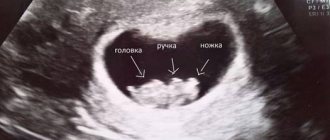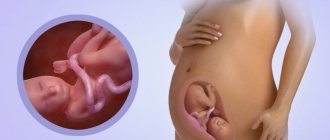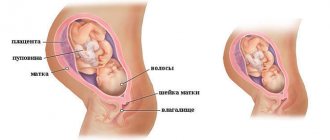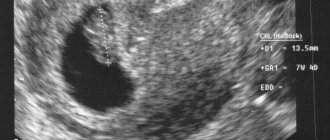Body changes and new sensations for women
An expectant mother at 9 weeks pregnant may feel overwhelmed. And there seems to be little work, but still no strength... This is due to the fact that her body, which is now working in an enhanced mode, needs more energy to maintain vital organs and systems. In addition, increased fatigue is often caused by a lack of iron in the body (anemia during pregnancy). It is clear that a pregnant woman needs several times more iron - she not only uses it herself, but also provides it to her child, whom she carries under her heart. A lot of iron also goes into “building” the placenta. Be sure to tell your doctor about your condition - he will prescribe you the necessary multivitamin complexes. Anemia, not corrected in time in the early stages, reaches its peak in the second half of the “interesting situation”, which leads to hypoxia (oxygen starvation) and delayed development of the baby.
What happens in the ninth week of pregnancy
The body of a pregnant woman continues to work in an intensive mode. In the ninth week, the following processes occur in it:
- HCG levels continue to increase.
- The uterus grows a little more this week and reaches the size of a grapefruit.
- Hormone levels continue to rise.
- The breasts continue to increase in size, which can cause pain for a pregnant woman. The nipples become darker.
- Gradually, the frequent urge to urinate begins to subside.
- As a result of slow bowel movements, constipation may occur.
- The amount of circulating blood increases by 50% compared to the time when the woman was not pregnant. In this regard, increased stress falls on the kidneys, lungs and heart.
- The body begins the process of deposition of fats for subsequent breastfeeding.
- The fetus takes up a lot of fluid, so the mother's hair and skin become drier.
- A yellowish discharge appears from the vagina.
- From this week, the placenta begins to work at almost full capacity, providing the fetus with everything it needs.
Lifestyle
Put off not-so-pleasant conversations and things for later, don’t move or carry heavy objects, don’t take antibiotics, don’t listen to very loud music, don’t have contact with sick people, don’t sit at the computer for a long time, don’t sunbathe on the beach under the scorching sun - try to avoid that , which, in your opinion, could harm the unborn child. It’s better to lead a measured lifestyle, take your time, read books, listen to classical calm music and don’t worry about trifles!
Discharge at 9 weeks of pregnancy
This week, almost all women experience various vaginal discharges. Thick white discharge may be a symptom of thrush development. In this case, it is necessary to take a smear to ensure the absence of the disease. If the test is positive, the doctor will prescribe treatment.
Red or brown discharge in the ninth week is a very dangerous symptom that may indicate a threat of miscarriage, the development of an ectopic or frozen pregnancy. In this case, you should immediately consult a doctor to provide the necessary assistance. Timely medical intervention can save the life of both the unborn child and his mother.
It should be remembered that spotting this week may be a consequence of the placenta implanting into the uterus. This is not dangerous for the pregnant woman and the fetus, but it is still worth seeing a doctor.
If the discharge is clear and odorless, then this is considered normal. The appearance of such discharge is associated with the vital activity of the vaginal microflora and is a consequence of changes in hormonal levels.
Nutrition
Nutrition in the 9th week of pregnancy
Nutrition for a pregnant woman is the basis for a favorable pregnancy. In the 9th obstetric week, it is necessary to pay special attention to products containing vitamins C, P, K, Zn, Mg, Fe.
It is advisable to include in the diet:
- red meat, liver;
- fish;
- citrus;
- rose hips, raspberries, grapes;
- tomatoes, lettuce;
- bananas;
- eggs;
- olive oil;
- almonds, walnuts, dates, sunflower seeds;
- spinach;
- beans;
- dairy products.
The changes taking place in the body require a woman to follow certain rules of eating:
- in the morning, before getting out of bed, it is advisable to eat a small amount of the food that helps overcome nausea and prevent vomiting;
- Do not mix many different products with each other. It is advisable to increase the number of meals by 6-7 per day, every 2-3 hours. It is recommended to take 1 type of food at one meal, and then allow it to digest for some time;
- drink enough clean water. It is advisable to drink about 1.5 liters of ordinary water per day;
- do not overeat, stop eating until you feel full;
- pay more attention to the quality of products than their quantity.
Vitamins
Vitamins in the 9th week of pregnancy
Vitamins and minerals during pregnancy are very important for a favorable pregnancy. The ideal option is if a woman receives most of the nutrients through food.
In the absence of certain elements (B9) or their insufficient presence in food (Iodine), the gynecologist may prescribe additional chemical compounds. Self-administration of pills or vitamins is not recommended.
If a woman doubts that her body has sufficient intake of all the necessary vitamins and microelements, or signs of a lack of certain substances appear (changes in well-being, skin and hair condition), then the doctor may prescribe vitamin complexes.
You should beware of self-prescribing vitamins without first consulting a gynecologist.
An excess of minerals and vitamins is just as dangerous as their deficiency.
Second growth spurt (8-9 weeks)
Title: “Knowing your body”
Time of occurrence: 2 months from the PDR
The calendar shows the second month of the baby’s life. Mom has already come up with an idea for a themed photo shoot dedicated to this little occasion. But this idea is ready to be abandoned, because the child is behaving strangely again. He cries and screams, does not leave his mother’s arms and constantly attaches himself to the breast.
Don't be scared! The baby was not jinxed, her soul was not stolen (since you posted the photo on IG before Baba Zina allowed), and you have enough milk.
What's happening
Around two months of age, newborns have a sharp increase in head circumference. The baby begins to accept a huge flow of various information from the world around him, so the load on the nervous system increases significantly. Therefore, of course, he is looking for a quiet haven near his mother, or better yet, in his arms/chest. The leap occurs not only in the physical sphere, but also in the psycho-emotional one. Therefore, the baby may take longer to go to bed (due to overexcitation) and sleep worse. It’s not for nothing that the 8th week of a baby’s life is called “the peak of crying”, because... During this period of life, children are the most tearful and sensitive. At the peak, the baby has seizures in the evenings: the baby screams, stretches out like a string, does not take the breast, does not respond to rocking. This obscurantism lasts about half an hour and ends as abruptly as it began. Sometimes, to distract and calm the baby, it helps to place the baby’s feet under warm water. Knowing these features of the baby’s development, the mother needs to be prepared and not be scared. But you should be patient and just wait out this period of time.
Signs of a jump
- ♦The baby becomes nervous, irritable, noisy;
- ♦Appetite worsens;
- ♦The child sucks her thumb more often;
- ♦Sleep becomes more restless;
- ♦The baby does not leave his mother’s arms;
- ♦A baby can literally hang on her chest, but not to satisfy her hunger. but as a reassurance.
How long does the jump last?
The crisis occurs individually in all children, both in duration and in symptoms. But most often, the difficult time occurs in the 8th week after PDR and lasts one to two weeks.
How to help your child
1) Give the baby more maternal care and affection (take him with you when moving around the apartment); 2) Continue to try in every possible way to calm down by any means; 3) Praise the child for small (and for him such huge) achievements; 4) Communicate more with the baby: read, speak in different voices, tell stories; 5) Show various objects, slowly moving them to a distance; 6) Teach the baby to hold his head and various objects in his hands; 7) Continue breastfeeding if your baby suddenly seems to refuse the breast.
What skills does the baby acquire at the end of the jump?
- Hold your head, turning it behind a moving object; — Examines his arms and legs with curiosity; - Holds the rattle in his hands; - Interested in everything that moves in his field of vision; - Announces himself loudly and clearly; - Emotions appear; — The colic begins to subside (hallelujah!).
As you can see, after the second jump, the baby acquires many new skills that he will be happy to hone without giving up. Until the third leap comes knocking on the door...
Vera Borisovets Senior supervisor
Tests and studies during pregnancy
Ultrasound (ultrasound examination) - 5 weeks after the first day of the last menstruation, according to indications.
Diagnosis of pregnancy, exclusion of ectopic pregnancy. Blood test for AIDS (HIV), syphilis (RW), hepatitis B - when registering for pregnancy (antenatal clinic, specialized medical center, advisory clinic at a maternity hospital, etc.). These diseases can complicate the course of pregnancy and require a special approach to patient management.
Analysis for blood group and Rh factor - when registering for pregnancy. If there is a risk of Rh conflict (if the woman has a negative Rh factor and the husband has a positive one), pregnancy requires special monitoring.
General and biochemical blood test, blood sugar test - when registering for pregnancy. They give an idea of the general health of the pregnant woman and possible chronic diseases.
General urine test - when registering for pregnancy, then before each visit to the doctor. Indicates the quality of kidney function.
Vaginal smear - when registering for pregnancy. Assessment of microbial flora, exclusion of urogenital infections.
Tests for urogenital infections - according to indications .
Hormone analysis - according to indications .
It is possible and it is not possible
The rules of conduct for a pregnant woman in the 9th obstetric week of pregnancy remain the same:
- Avoid smoking (active and passive);
- Do not consume alcohol and unhealthy foods (fast food, smoked meats, pickles, etc.);
- Maintain hygiene and keep the room clean (daily wet cleaning, frequent ventilation);
- Walk a lot in the fresh air;
- Get good rest: sleep at least 10 hours at night, an hour during the day if possible;
- Avoid stress and crowded places;
- Do not resort to self-medication;
- Avoid contact with complex chemical compounds;
- Do not wear high heels.
At the 9th obstetric week of pregnancy, it is good to start engaging in the types of physical activity allowed for pregnant women:
- yoga;
- Pilates;
- swimming;
- walking.
These types of physical activity improve the supply of oxygen to the body and help train the body for future childbirth and caring for the baby.
In addition, moderate exercise improves mood and promotes the production of endorphins (the hormone of joy).
Sex
Sex in the 9th week of pregnancy (according to obstetric calculations) is not prohibited. Restrictions are imposed on women who experience undesirable symptoms (bleeding, temperature above 37.5 degrees Celsius, severe toxicosis expressed by vomiting).
To know for sure whether you can have sex during your current pregnancy period, you need to ask your doctor about it at your appointment.









